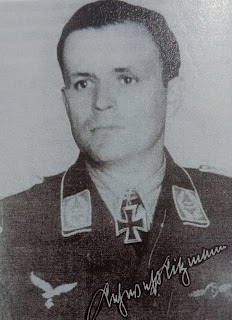"..In front of me, one aircraft after the other was now plunging steeply downwards. I also guided the Ju-88 into the dive ... Suddenly a flash of fire, a blow to the head. No more aircraft around me. I found myself free-falling, still strapped in the armoured seat ..plunging earthwards...."
In 1994 Jörn Lehweß-Litzmann wrote and published his father's memoir 'Absturz ins Leben' (lit. 'Crashing into life')
Grandson of WWI infantry general Karl Litzmann, Walter Lehweß-Litzmann joined the Reichswehr in 1925 and the Luftwaffe in 1933. According to his son's account, Lehweß-Litzmann 'was involved in building up the air force' as Aufklärer, Kampfflieger and Generalstabsoffizier.
In April 1941 as Maj. he was appointed Kommandeur of III./KG 1 and on July 7 crash-landed his Ju 88 A-5 (V4+AD) near the coast during an attack on Pernau
airfield, Estonia 'following engine failure'. He escaped back to friendly lines. Following the awards of the Ehrenpokal and the DKiG, he was named Kommodore KG 3 'Blitz' in April 1943. On 18 July 43 he was shot down in flames near Kharkov, making a belly-landing
in safe territory.
On September 7, 1943 he was the victim of an unlikely 'partisan action' - his Ju 88 blew up mid-sortie near Bulovka. According to one account a bomb had been planted on board, a story that originates in a 1987 'DDR Flieger Revue' article written by Lehweß-Litzmann's son entitled "Ein ungewöhnliches Fliegerleben". In the explosion he was 'catapulted' out of his Ju 88 A-5 (5K+AA) still strapped into his seat but managed to release himself and landed safely by parachute. Again according to his son's account, he became the highest-ranking airman (Kommodore) taken prisoner of war in the Soviet Union. Presumed KIA on the German side he was 'posthumously' awarded the RK (October 29, 1943).
Witnesses to the loss of the Ju 88 flown by the Kommodore concluded (self-evidently) that the machine had taken a direct hit from anti-aircraft fire. Three parachutes were seen, one of which was on fire and failed to open correctly. This was most probably the BO/observer SFw. Stefan Rajek who was found by the Russians severely injured but who reportedly died in a (German) air attack en route to a field hospital. Bordfunker Uffz. Ulrich Oelner crashed with the machine. BM/S (flight engineer/gunner) Gfr. Gunther Herzog was also taken prisoner.
In captivity Lehweß-Litzmann's " first impressions of the Russians were completely at odds with all the anti-communist propaganda that he had been fed up to that point.." He was already apparently a Russian speaker and eventually actively joined the anti-Hitler 'Nationalkomitee Freies Deutschland' (NKFD) movement, the "new, supposedly democratic path for Germany".
He was of course stripped of his decorations. After a new start post-war as a journalist in the midst of a divided Berlin, he participated in the build-up of the air force of the East German state and 'made his contribution to the remarkable performance' of civil aviation in the DDR (East 'German Democratic Republic'), being responsible for crew and pilot training at Interflug, not as Bergstrom says, as 'head of Interflug'..Lehweß-Litzmann may eventually have been side-lined as an embarassment to the East German state who prided themselves on establishing an air force and an airline without recourse to former decorated members of the Wehrmacht. In Jörn Lehweß-Litzmann's account it was a bad car crash in 1969 that put a 'premature' end his fathers career...
with thanks as usual to the De Zeng/Stankey Luftwaffe Officer career summaries here and to Alexander Steenbeck for a copy of Jörn Lehweß-Litzmann's 1987 article on his father's 'unusual aviator's career..'


